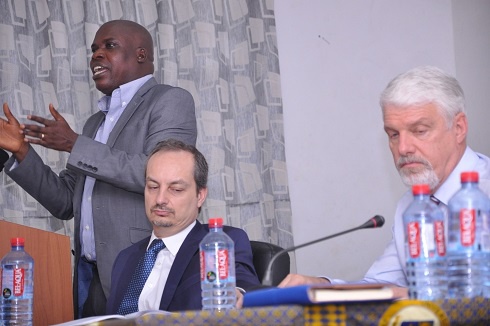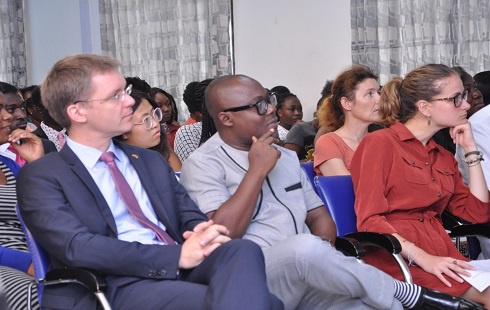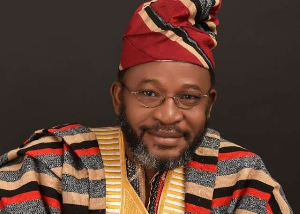The Centre for European Studies (CES) held its first lecture series for 2018 on the theme “Interrogating the Forces behind Migration from Africa to Europe”.
The event took place on Friday 16th March 2018 at the Kofi Drah Conference Hall of the Department of Political Science, University of Ghana. It was attended by 400 participants comprising students, faculty, civil society, media practitioners, clergy, traditional authorities, parliamentarians, policy makers, Ambassadors, European Union Delegation in Ghana and other EU-Member country representatives in Ghana.
In his welcome address, Professor Ransford Gyampo, Director for the Centre noted that in 2017, the CES held about six lecture series on critical and topical issues relating to European Studies. These generated passion, interest and understanding among students and other key stakeholders on matters relating to Europe.
This year (2018), the CES, according to Professor Gyampo, would continue its lecture series by conducting more research into other topical issues of European Studies, one of which is Migration. Africa and for that matter, Ghana continues to lose her labour force required to contribute to development through migration. The International Organization for Migration estimates close to ten million African-migrants in Europe.
This, according to the CES Director, has undoubtedly had a negative effect on the quest for development in many African countries including Ghana over the years. Yet many young people including students still desire to migrate to Europe after school.
According to Prof Gyampo, the search for greener pastures as a major reason for migration seem simplistic as evidence abounds to show that quite a number of young people gainfully employed in many African countries still prefer to abandon their jobs at home to join their African migrant counterparts in Europe.
So, what at all is in Europe that attract young African migrants there? What are the exact causes of migration, particularly among young people who complete their education and have bright prospects of succeeding in Ghana? What are the effects of migration on countries of origin and host countries? What are the experiences of migrants in Europe in terms of human rights and living conditions? How can the problems of migration be reduced?
According to Prof Gyampo, the lecture on migration was strictly an evidence-based research conducted by one of the astute Adjunct Fellows of CES, to respond to the above and allied questions. He expressed the hope that the outcomes and general conclusions reached would help students appreciate the key issues of migration and minimize their quest to leave the shores of the country after school.
In her brief remarks, the Chairperson of the event, Her Excellency Alicia Rico, Spanish Ambassador to Ghana noted that the chosen theme for the lecture was timely and stressed the need for students to be abreast with the key issues and dangers of migration to the individual, countries of origin and host countries. She commended the CES for their initiatives in promoting European Studies and pledged her support for the Centre’s activities.

Ambassador Alicia Rico, Spanish Ambassador to Ghana delivering her remarks as Chairperson
Head of the EU Delegation, Ambassador William Hanna commended the CES for its continuous efforts at promoting research and teaching in European Studies. He noted that the issues of migration are rather complex and require a partnership between the EU, governments and Civil Society in dealing with the challenges imposed by the phenomenon of irregular flight from Africa to Europe.
He called on governments to take full advantage of the trade partnerships between Europe and Africa in order to generate much wealth for development. He described the numerous deaths and casualties associated with irregular migration as needless and unnecessary dissipation of talents, brains and human resources of many African countries.
In his presentation, Professor Joseph Teye, Adjunct Fellow of CES and Director for the Centre for Migration Studies noted that migration has historically been an integral part of life, but has more recently become a topic of major focus in policy and academic circles.
The global stock of international migrants increased from 173 million in 2000 to 247 million in 2016, representing 3.3 percent of the world’s population. In Africa, migration is largely undocumented, making it difficult to provide accurate data on the number of Africans living in other countries.
Although more than 60 percent of African migrants move to destinations within the region, Europe is a major destination of Africans who migrate outside the region. While the recent increase in the flow of irregular migrants from Africa to Europe has attracted the attention of the media and governments of both African and European countries, there is little understanding of the actual forces behind such movements.

Prof. Joseph Teye delivering his research findings. Also on the High Table were the Italian Ambassador to Ghana, Giovanni Favilli and Head of EU Delegation in Ghana, William Hanna
While poverty has often been blamed for the massive flow of migrants from Africa to Europe, research findings show that irregular migrants are not the poorest in the African society, as very poor people do not have the resources needed to fund international migration. Professor Teye, therefore, identified four broad forces behind migration from Africa to Europe, namely predisposing, proximate, precipitating, and mediating drivers.
While migration from Africa to Europe has both positive and negative impacts, Prof Teye noted that the high level of irregular migration is disturbing. He outlined some of the gruelling dangers and challenges of African migrants in host countries in addition to the losses incurred by the countries of origin of migrants.
He recommended policies aimed at controlling irregular migration from Africa to Europe. He argued that strict border control measures alone are bound to fail and that there is a need for African and European governments to work together to address the fundamental inequalities between the two regions. There is also a need to address the proximate and precipitating drivers of migration such as poverty, unemployment, environmental hazards, and conflicts.
Successful implementation of existing legal migration possibilities, including South-South labour migration within ECOWAS, according to Prof Teye, will also go a long way to reduce irregular migration flows from Africa to Europe.
The lecture generated intense discussions among students and stakeholders with EU-Member country representatives sharing their experience and perspectives on the issues. Student participants expressed gratitude to the Centre for the opportunity to be educated and sensitized on the issues. They called on governments to deal with the core factors that push young people into Europe and undermine the quest for a strong labor force to power developmental efforts.

Some participants at the event
They also called on the European Union to work out some modalities that provide channels to make legal migration possible by providing short-term guest worker programmes for young people who graduate from school in Africa. This in their view could grant the needed travel experience to students and douse their intense desire to travel out immediately after school.
In her brief closing remarks, the Spanish Ambassador applauded the candour and frankness of students in discussing the issues raised in the presentation. She called on all stakeholders to consider the policy recommendations articulated in the lecture seriously to minimize irregular migration and ensure that Africa’s human resource base is not unnecessarily depleted to perpetuate poverty among the people of the continent.
Ambassador Alicia Rico once again thanked the Centre for European Studies for its pioneering role as the only Centre for European Studies in the whole of West Africa. She pledged a deepened collaboration between the Spanish Embassy and the Centre.
General News of Friday, 16 March 2018
Source: www.ghanaweb.com













